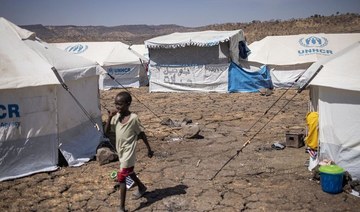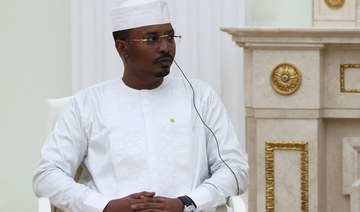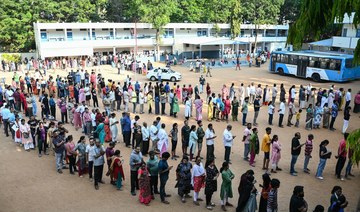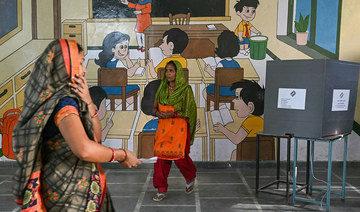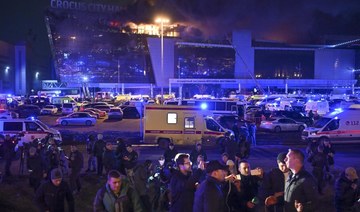HARTFORD, Connecticut: The father of a victim of the Sandy Hook Elementary School massacre has won a defamation lawsuit against the authors of a book that claimed the shooting never happened — the latest victory for victims’ relatives who have been taking a more aggressive stance against conspiracy theorists.
The book, “Nobody Died at Sandy Hook,” has also been pulled from shelves to settle claims against its publisher filed by Lenny Pozner, whose 6-year-old son Noah was killed in the shooting.
“My face-to-face interactions with Mr. Pozner have led me to believe that Mr. Pozner is telling the truth about the death of his son,” Dave Gahary, the principal officer at publisher Moon Rock Books, said Monday. “I extend my most heartfelt and sincere apology to the Pozner family.”
A Wisconsin judge issued a summary judgment Monday against authors James Fetzer and Mike Palacek, a ruling that was separate from the settlement between Pozner and the book’s publisher. A trial to decide damages has been set for October.
Pozner has been pushing back for years against hoaxers who have harassed him, subjected him to death threats and claimed that he was an actor and his son never existed. He has spent years getting Facebook and others to remove conspiracy videos and set up a website to debunk conspiracy theories.
Lately, the fight has been joined by others who lost relatives in the Dec. 14, 2012, school shooting in Newtown, Connecticut. After quietly enduring harassment and ridiculous assertions for years, some have changed their approach, deciding the only way to stop it is to confront it. Their efforts have turned the tables on the hoaxers, including Alex Jones , host of the conspiracy-driven Infowars website.
Victims’ families scored another victory Tuesday when a Connecticut judge imposed sanctions on Jones for an outburst on his web show against one of the families’ lawyers.
Judge Barbara Bellis on Tuesday ordered the Infowars host to pay some of the relatives’ legal fees and prohibited him from filing motions to dismiss their defamation lawsuit against him.
The families of several of the 20 children and six educators killed in the 2012 shooting are suing Jones, Infowars and others for promoting the hoax theory.
Jones made angry comments on his show Friday about a lawyer for the families, accusing him of trying to frame him by planting child pornography in documents Jones’ attorneys submitted to the families’ lawyers.
Robbie Parker, whose 6-year-old daughter Emilie was among those killed at Sandy Hook, spent years ignoring people who called him a crisis actor. His family moved to the West Coast, but still the harassment didn’t stop. He would get letters from people who found his address. He was once stopped in a parking garage by a man who berated him and said the shooting never happened.
“You are taught when you are young that you ignore bullies and eventually they will leave you alone,” Parker said. “But as time went on, and my other girls were getting older, I realized they weren’t stopping and some of this was getting worse and getting more personal.”
Parker is now part of a lawsuit against Jones, has testified before Congress and pushed for changes on social media platforms, such as YouTube, which announced this month it will prohibit videos that deny the Sandy Hook shooting and other “well-documented events.”
“It wasn’t until the lawsuits and until it became a mainstream news story that people realized they were being complicit in this and started to moderate the content,” Parker said.
Pozner is the lead plaintiff in several of at least nine cases filed against Sandy Hook deniers in federal and state courts in Connecticut, Florida, Texas and Wisconsin.
In the case against Jones, the families of eight victims and a first responder say they’ve been subjected to harassment and death threats from his followers. A Connecticut judge ruled in the defamation case that Jones must undergo a sworn deposition, which is scheduled for July in Texas.
On Monday lawyers for the families disclosed that child pornography was found in electronic files sent to them by Jones as part of the discovery process. An attorney for Jones said the pornography was in emails sent to his client that were never opened.
Wisconsin’s Dane County Circuit Judge Frank Remington ruled Monday that Pozner had been defamed by Fetzer and Palacek, whose book claimed, among other things, that Noah’s death certificate had been faked, according to Pozner’s lawyer, Jake Zimmerman.
“If Mr. Fetzer wants to believe that Sandy Hook never happened and that we are all crisis actors, even that my son never existed, he has the right to be wrong. But he doesn’t have the right to broadcast those beliefs if they defame me or harass me,” Pozner said. “He doesn’t have the right to use my baby’s image or our name as a marketing ploy to raise donations or sell his products. He doesn’t have the right to convince others to hunt my family.”
Before the case went to a judge, Fetzer had said “evidence clearly shows this wasn’t a massacre, it was a FEMA drill,” referring to the Federal Emergency Management Agency.
“If you believe otherwise, then you are being played,” Fetzer, a Wisconsin resident, said at the time.
A redacted copy of the actual death certificate is attached to Pozner’s lawsuit. Additionally, Pozner has had DNA samples taken and compared with those provided by the Connecticut medical examiner to prove that Noah was his son. He has put Noah’s birth certificate, report cards and medical records into the public file in his legal actions.
His goal, he says, is to make sure that “normal people” have access to the truth and aren’t persuaded by the hoaxers.
A Florida woman, Lucy Richards, was sentenced to five months in prison for sending Pozner death threats. She was also banned from visiting web sites run by conspiracy theorists, including Fetzer.
Christopher Mattei, a lawyer who represents the families in their Connecticut lawsuit against Jones, said his clients want to live their lives free from that kind of harassment. They also want these hoaxers to know they are affecting real people, who have already been emotionally devastated.
“When the grief process includes having to justify your grief or having to prove your child’s existence,” he said, “it makes it very difficult.”
Father of boy killed in school massacre wins defamation suit
Father of boy killed in school massacre wins defamation suit
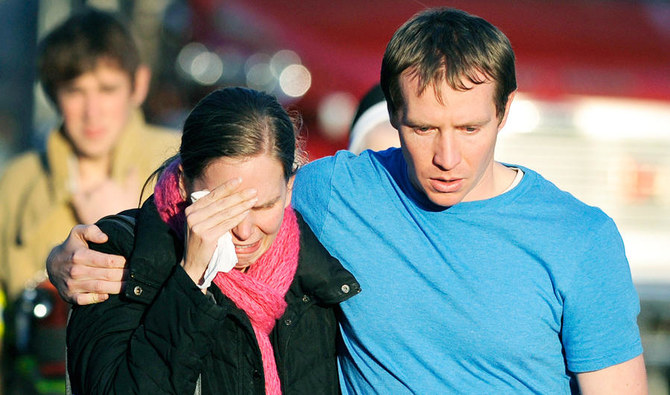
- Victims’ families scored another victory Tuesday when a Connecticut judge imposed sanctions on Jones for an outburst on his web show against one of the families’ lawyers
US troops to leave Chad in second African state withdrawal
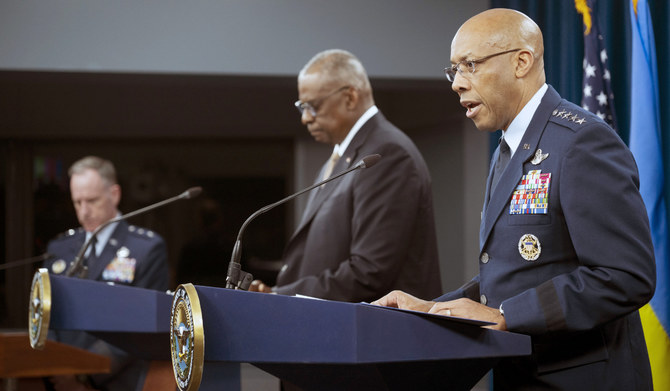
- It is important to stress that this withdrawal in no way signifies a break in cooperation between the two countries in the fight against terrorism
WASHINGTON: The US will withdraw some troops from Chad, the Pentagon has said, days after Washington agreed to move forces out of neighboring Niger.
The US has approximately 100 troops stationed in Chad as part of its strategy to combat extremism in West Africa.
“USAFRICOM is currently planning to reposition some US military forces from Chad, a portion of which were already scheduled to depart,” Pentagon press secretary Maj. Gen. Pat Ryder told a news conference, referring to the US Africa Command.
“This is a temporary step as part of an ongoing review of our security cooperation, which will resume after Chad’s May 6 presidential election.”
The withdrawal of about 75 US Army Special Forces personnel is scheduled to begin this weekend and be completed within days unless there are last-minute diplomatic developments, the New York Times reported, citing US officials.
Chad’s air force chief had ordered the US military this month to halt activities at an air base near the capital N’Djamena, according to a letter sent to the transitional government.
He said he had asked the US military to provide documents “justifying its presence at the Adji Kossei Air Base” but had not received any.
US troops at the Adji Kossei military base train anti-terrorism special forces and an elite unit of the Chadian army to combat the Nigerian jihadist group Boko Haram.
“The presence of American forces in Chad was initially motivated by a common commitment to the fight against terrorism, an objective shared between the two nations,” a Chadian government spokesperson said.
“However, the Chadian general staff has expressed concerns about this presence,” said Abderaman Koulamallah. In recognition of the concerns expressed, the US government has decided to temporarily withdraw its forces from Chad.
“It is important to stress that this withdrawal does not in any way signal a break in cooperation between the two countries in the fight against terrorism.
“Further discussions will take place to explore the possibility of the return of US forces in the case of a specific bilateral agreement between the two nations.”
Neighboring Niger is also a linchpin in the US and French strategy to combat jihadists in the region.
But Niger’s ruling military junta said in March that it was ending a military cooperation agreement with Washington, claiming it had been imposed and the US troop presence was illegal.
Washington this week began discussions with Niger on withdrawing the more than 1,000 US personnel in the country, which is also home to a $100-million American drone base.
The US will “continue to explore options on how we can ensure that we’re able to continue to address potential terrorist threats” in the wake of the withdrawal, Ryder said this week following the announcement of the US pull-out from Niger.
General Mahamat Idriss Deby Itno seized the presidency of Chad in a 2021 coup after the death of his father, Idriss Deby Itno, who had ruled the Sahel country with an iron fist for more than three decades.
He announced in March his candidacy in the upcoming presidential election that has seen opposition candidates banned from running, and his main rival Yaya Dillo Djerou shot dead in an army assault on his party headquarters.
Voter turnout slumps, Modi ‘wave’ missing from India’s 2024 polls
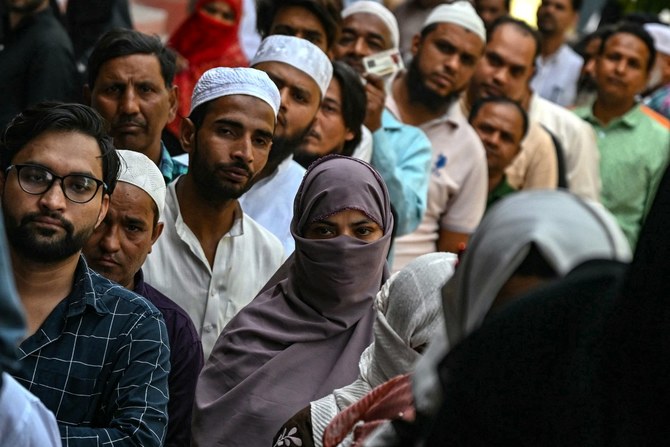
- India’s general election started on April 19 and is taking place in seven phases till June 1
- Voters are battling extreme temperatures as parts of India gripped by heatwave
NEW DELHI: Voter numbers have slumped in the first and second phase of India’s general election, with experts saying that the “wave” of enthusiasm that brought incumbent Prime Minister Narendra Modi to power in 2014 was no longer present in the ongoing polls.
More than 968 million people have been registered to vote in the world’s biggest general election, in which Modi and his Hindu nationalist Bharatiya Janata Party are aiming for a rare third consecutive term in power.
The first phase of voting was on April 19 and the polls are taking place over six weeks, with results expected on June 4.
India has a total of 28 states and eight federally governed territories. Some regions complete the process on a single day, while others spread it out over several phases.
The second phase was on April 26 and the other voting dates will be May 7, May 13, May 20, May 25 and June 1.
Friday’s turnout was estimated by the Election Commission of India at 61 percent — compared with 68 percent in the second phase five years ago. In the first phase, it was 65 percent against nearly 70 percent in 2019.
The lower turnout showed “apathy toward politics,” D. Dhanuraj, chairman of the Kerala-based Center for Public Policy Research, told Arab News.
“I think it is clear now that there is no wave in favor of any party as such. In 2014, there was a wave, in 2019 there was a wave,” he said, referring to the enthusiastic pro-Modi balloting in the past two general elections.
“(In) 2024, there was a talk that there was a wave, but I think it is becoming clear that there is no such wave, no wave that would give exponential majority in the parliament to any party.”
Modi and his BJP-led National Democratic Alliance are challenged by an alliance of two dozen opposition parties — the Indian National Developmental Inclusive Alliance, or INDIA — led by the Congress party, which has ruled the country for close to 45 years since independence in 1947.
Congress plunged to a historic low when it was swept out of power by the BJP in the 2014 and 2019 general vote, and won its second-lowest number of 52 seats in 2019, when Modi’s party enjoyed a landslide victory, winning 303 out of 543 seats in the lower house of parliament.
The party or coalition that wins at least 272 parliamentary seats forms the government.
In 2024, Modi has been aiming for 400 seats for the National Democratic Alliance led by his BJP. But the target, often cited ahead of the first phase, has not been repeated.
Although pre-poll surveys suggested Modi would easily win, it is no longer projected to be a landslide as in in the two previous elections.
“It was the electoral rhetoric of the BJP to cross 400 seats, but this reality is not happening, it seems now,” Satish Kumar Singh, political analyst in Delhi, told Arab News.
“The BJP gave that slogan just to galvanize voters. When there is less voting that also means that the BJP might not have a whopping majority, it might be close to a simple majority.”
Another factor deterring voters from standing in long queues at polling stations was the hotter-than-normal summer, with temperatures in some states on Friday exceeding 40 degrees Celsius.
“There is no wave but heatwave in this election,” Singh said. “That is keeping the voters away from the polling booths.”
Not all experts expected the lower turnout to affect the ruling party’s chances in the polls.
“There seems to me no empirical evidence that if voter turnout increases it supports any side — the ruling (party) or the opposition,” said Sandeep Shashtry, political analyst and vice-chancellor of Jagran Lakecity University in Bhopal.
“I think we cannot make a generalization about the wider implications.”
Anti-war protesters dig in as some schools close encampments after reports of antisemitic activity
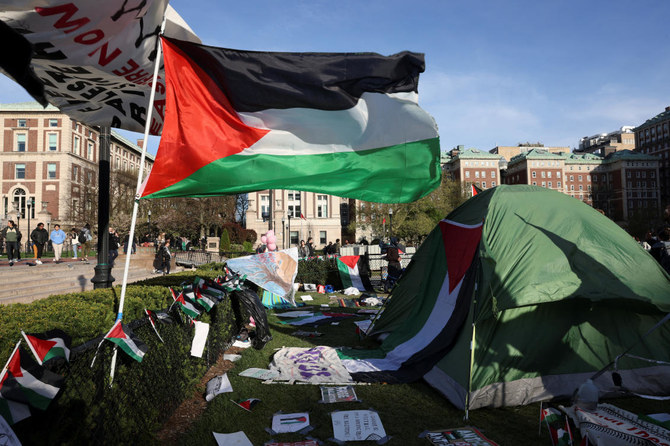
- Protesters nationwide are demanding that schools cut financial ties to Israel and divest from companies they say are enabling the conflict
- Early Saturday, police in riot gear cleared an encampment on the campus of Northeastern University in Boston while several dozen students shouted and booed at them
NEW YORK: As students protesting the Israel-Hamas war at universities across US dug in Saturday and vowed to keep their demonstrations going, some universities shut down encampments after reports of antisemitic activity among the protesters.
With the death toll mounting in the war in Gaza, protesters nationwide are demanding that schools cut financial ties to Israel and divest from companies they say are enabling the conflict. Some Jewish students say the protests have veered into antisemitism and made them afraid to set foot on campus.
Early Saturday, police in riot gear cleared an encampment on the campus of Northeastern University in Boston while several dozen students shouted and booed at them from a distance, but the scene was otherwise not confrontational.
The school said in a statement that the demonstration, which began two days ago, had become “infiltrated by professional organizers” with no affiliation to the school and protesters had used antisemitic slurs.
“We cannot tolerate this kind of hate on our campus,” the statement posted on the social media platform X said.
The University of Pennsylvania took similar action Friday when interim President J. Larry Jameson called for an encampment of protesters on the west Philadelphia campus to be disbanded, saying it violates the university’s facilities policies.
The “harassing and intimidating comments and actions” by some protesters violate the school’s open expression guidelines as well as state and federal law, Jameson said, and vandalism of a statue with antisemitic graffiti was “especially reprehensible and will be investigated as a hate crime.”
“I am deeply saddened and troubled that our many efforts to respectfully engage in discourse, support open expression, and create a community that is free of hate and inclusive for everyone have been ignored by those who choose to disrupt and intimidate,” he said.
At Columbia University, where protesters have inspired pro-Palestinian demonstrations across the country, negotiations continued with those at the student encampment.
The university’s senate passed a resolution Friday that created a task force to examine the administration’s leadership, which last week called in police in an attempt to clear the protest, resulting in scuffles and more than 100 arrests.
Though the university has repeatedly set and then pushed back deadlines for the removal of the encampment, the school sent an email to students Friday night saying that bringing back police “at this time” would be counterproductive.
Decisions to call in law enforcement, leading to hundreds of arrests nationwide, have prompted school faculty members at universities in California, Georgia and Texas to initiate or pass votes of no confidence in their leadership. They are largely symbolic rebukes, without the power to remove their presidents.
But the tensions pile pressure on school officials, who are already scrambling to resolve the protests as May graduation ceremonies near.
California State Polytechnic University, Humboldt, gave protesters who have barricaded themselves inside a building since Monday until 5 p.m. Friday to leave and “not be immediately arrested.” The deadline came and went. Only some of the protesters left, others doubled down. After protesters rebuffed police earlier in the week, the campus was closed for the rest of the semester.
In Colorado, police swept through an encampment Friday at Denver’s Auraria Campus, which hosts three universities and colleges, arresting about 40 protesters on trespassing charges.
Students representing the Columbia encampment said Friday that they reached an impasse with administrators and intend to continue their protest. After meetings Thursday and Friday, student negotiators said the university had not met their primary demand for divestment.
In the letter sent to Columbia students Friday night, the university’s leadership said “we support the conversations that are ongoing with student leaders of the encampment.”
Columbia’s president, Minouche Shafik, faced significant criticism from faculty Friday, but retained the support of trustees.
A report by the university senate’s executive committee, which represents faculty, found Shafik and her administration took “many actions and decisions that have harmed Columbia University.” Those included calling in police and allowing students to be arrested without consulting faculty, misrepresenting and suspending student protest groups and hiring private investigators.
Also Friday, Columbia student protester Khymani James walked back comments made in an online video in January that recently received new attention. James said in the video that “Zionists don’t deserve to live” and people should be grateful James wasn’t killing them.
“What I said was wrong,” James said in a statement. “Every member of our community deserves to feel safe without qualification.”
James, who served as a spokesperson for the pro-Palestinian encampment as a member of Columbia University Apartheid Divest, was banned from campus Friday, according to a Columbia spokesperson.
Protest organizers said James’ comments didn’t reflect their values. They declined to describe James’ level of involvement with the demonstration.
In France, students at the Paris Institute of Political Studies, which counts President Emmanuel Macron among its many famous alumni, students blocked access to a campus building and classes went online as the wave of protests reached overseas.
Police clashed with protesters Thursday at Indiana University, Bloomington, where 34 were arrested; Ohio State University, where about 36 were arrested; and at the University of Connecticut, where one person was arrested.
The University of Southern California canceled its May 10 graduation ceremony Thursday, a day after more than 90 protesters were arrested on campus. The university said it will still host dozens of commencement events, including all the traditional individual school ceremonies.
Universities where faculty members have initiated or passed votes of no confidence in their presidents include Cal Poly Humboldt, University of Texas at Austin and Emory University.
Russia says it struck Ukrainian energy plants in response to Kyiv targeting its own energy sector
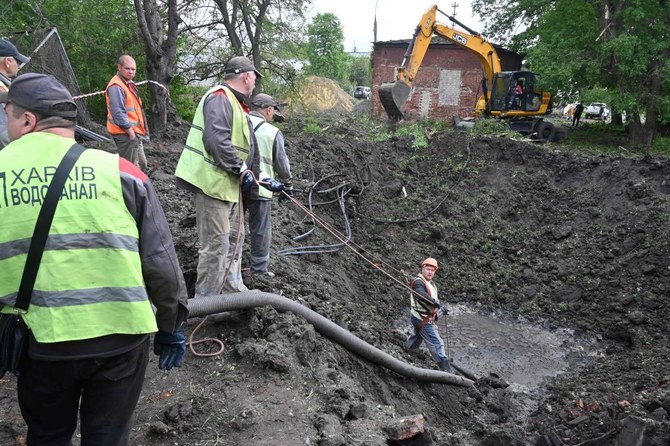
- The strikes were “in response to attempts by the Kyiv regime to damage Russian energy and industrial facilities“
- Ukraine has systematically targeted Russian oil refineries and other facilities in drone attacks in recent weeks
MOSCOW: The Russian Defense Ministry said on Saturday that its forces had carried out 35 strikes in the last week against Ukrainian energy facilities, defense factories, railway infrastructure, air defenses, and ammunition stocks.
It said in a statement that the strikes, which spanned April 20-27, were “in response to attempts by the Kyiv regime to damage Russian energy and industrial facilities.”
Ukraine has systematically targeted Russian oil refineries and other facilities in drone attacks in recent weeks, ignoring US requests not to do so.
Ukrainian officials said Russian missiles had pounded power facilities in central and western Ukraine on Saturday, increasing pressure on the ailing energy system as the country faces a shortage of air defenses despite a breakthrough in US military aid.
The Russian Defense Ministry said its campaign of strikes had been conducted using sea- and air-launched long-range precision weapons, including Kinzhal hypersonic missiles and drones.
It said it had also targeted and hit Ukrainian troop formations as well as what it described as foreign mercenaries.
Philippine capital’s financial center to become halal hub
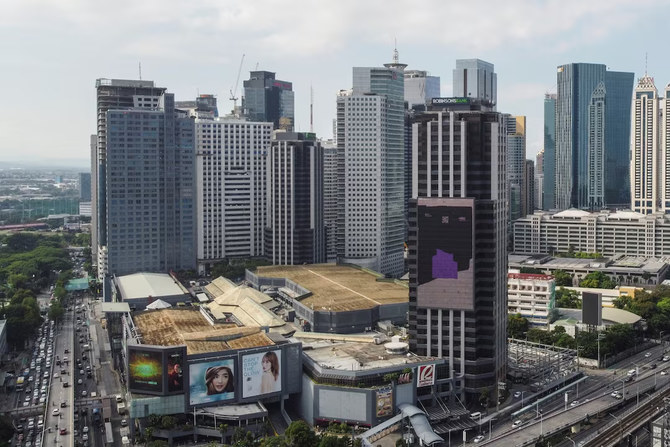
- Makati Halal Hub to act as a platform for manufacturers, traders and consumers
- Philippines’ central business district is perceived as trendsetter for other regions
MANILA: Philippine businesses in Makati City are joining hands with the Department of Trade and Industry to make the country’s financial center a halal hub, the head of the Philippine Chamber of Commerce and Industry’s Makati branch said on Saturday.
Makati City in Metro Manila is often referred to as the Philippines’ central business district. It has the highest concentration of banks and multinational and local corporations in the country. Foreign embassies are also based there.
The predominantly Catholic Philippines — where Muslims constitute about 10 percent of the nearly 120 million population — plans to raise 230 billion pesos ($4 billion) in investments and generate around 120,000 jobs by expanding its domestic halal industry by 2028.
The DTI signed on Friday a memorandum of understanding with PCCI Makati to join the government’s efforts to tap into the global halal market, which is estimated to be worth more than $7 trillion.
“To be able to implement its policies more effectively — such as the promotion and development of the country’s halal industry — they (the government) have to collaborate or strike a partnership with the business community or the businessmen who will be responsible in making this a reality,” PCCI Makati President Toots Cortez told Arab News.
“We can be the catalyst. We will begin by creating awareness, especially among the MSMEs (micro, small and midsize enterprises) because, according to the records of DTI, 99.5 percent of business in the Philippines are composed of SMEs.”
The agreement on establishing the Makati Halal Hub will position the city as a “central point for innovation and business in the halal sector, spanning a variety of industries including food production, financial services, and more,” the DTI said in a statement, as it expects the initiative to “provide substantial opportunities for Filipino entrepreneurs and international investors alike, fostering a robust economic ecosystem.”
According to the vision, the hub will act as a platform facilitating connections between manufacturers, traders, buyers, distributors and consumers in the halal sector.
“If we can group together and promote halal, I think that will be the best approach … You don’t need a big budget,” Cortez said.
“There are many Muslim embassies in Makati City, many restaurants and major establishments … Many tourists come to Makati, so if we can convince the establishments in Makati to be accredited as halal, that’s a good beginning from our side as a catalyst.”
He believes that the industry’s promotion in the city will make an impact as Makati is widely perceived as a trendsetter for other Philippine regions.
“The others, they follow the lead,” Cortez said. “They follow the lead on what’s happening in Makati City.”





